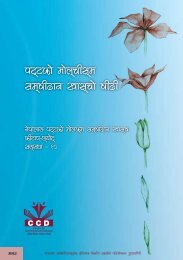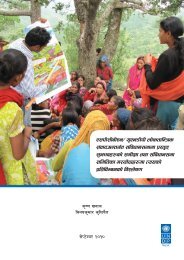- Page 6: Preface and acknowledgementState bu
- Page 9: Chapter 13 Reconciliation and reint
- Page 17 and 18: Post-conflict state buildingdebated
- Page 19 and 20: Post-conflict state buildingOthers
- Page 21: Post-conflict state buildinglead to
- Page 25 and 26: Post-conflict state buildingThe dev
- Page 27 and 28: Post-conflict state buildingReferen
- Page 30 and 31: Chapter2Conceptual framework forpos
- Page 32 and 33: The Remake of a StateThe first and
- Page 34 and 35: The Remake of a StateFigure 2.2 Com
- Page 36 and 37: The Remake of a StateFigure 2.4 Int
- Page 38 and 39: The Remake of a StateDealing with t
- Page 40 and 41: The Remake of a StateFigure 2.8 Fac
- Page 42 and 43: The Remake of a Statescience and in
- Page 44 and 45: The Remake of a StateKapilvastu dis
- Page 46 and 47: The Remake of a State2.7.3 Controll
- Page 48 and 49: The Remake of a Statetemporary. The
- Page 50 and 51: The Remake of a StateFigure 2.11 Co
- Page 52 and 53: 2.8 International relations and for
- Page 54 and 55: The Remake of a StateThough state e
- Page 56 and 57: The Remake of a StateThese mismatch
- Page 58 and 59: The Remake of a StateUpreti BR Nepa
- Page 60 and 61: Chapter3Private sector in post-conf
- Page 62 and 63: The Remake of a StateDuring the pas
- Page 64 and 65: The Remake of a StateThe data prese
- Page 66 and 67: The Remake of a State5. Foreign dir
- Page 68 and 69: The Remake of a Stateaid, people at
- Page 70 and 71: The Remake of a StateThe SLF campai
- Page 72 and 73:
The Remake of a Stateis a widesprea
- Page 74 and 75:
The Remake of a Stateoptions for th
- Page 76 and 77:
The Remake of a StateThe World Bank
- Page 78 and 79:
Chapter4Addressing poverty andpromo
- Page 80 and 81:
The Remake of a Stateof 1990 decide
- Page 82 and 83:
The Remake of a Statewidened gap be
- Page 84 and 85:
The Remake of a Stategiven for cate
- Page 86 and 87:
The Remake of a Statecommunity fore
- Page 88 and 89:
The Remake of a StateBox 4.4 Rajaya
- Page 90 and 91:
The Remake of a Statecoaching and s
- Page 92 and 93:
The Remake of a State6.1 DAGs or bi
- Page 94 and 95:
The Remake of a Statetime taken to
- Page 96 and 97:
The Remake of a StateReferencesBenn
- Page 98 and 99:
The Remake of a StatePokharel BK. 1
- Page 100 and 101:
Chapter5Sustainable tourism and pos
- Page 102 and 103:
2. Theoretical backgroundThe Remake
- Page 104 and 105:
The Remake of a StateFigure 5.1 Hol
- Page 106 and 107:
The Remake of a Statenation from to
- Page 108 and 109:
The Remake of a Statein the Nationa
- Page 110 and 111:
The Remake of a Statethrough apprec
- Page 112 and 113:
The Remake of a Stateforeign curren
- Page 114 and 115:
The Remake of a StateFigure 5.2 Ins
- Page 116 and 117:
The Remake of a StateYearTable 5.1
- Page 118 and 119:
The Remake of a Statethe nation but
- Page 120 and 121:
The Remake of a StateFrance L. 2006
- Page 122 and 123:
The Remake of a StateSNV Nepal. 200
- Page 124 and 125:
Chapter6Forestland reform:Transferr
- Page 126 and 127:
The Remake of a Statestatus of Nepa
- Page 128 and 129:
The Remake of a Statethe essential
- Page 130 and 131:
The Remake of a Statedevoted to sho
- Page 132 and 133:
The Remake of a Stateto be an inter
- Page 134 and 135:
The Remake of a Statenatural resour
- Page 136 and 137:
The Remake of a StateWhen there is
- Page 138 and 139:
The Remake of a StateBromley DW. 19
- Page 140 and 141:
The Remake of a StateNagendra H, Pa
- Page 142 and 143:
Chapter7Reconstruction anddevelopme
- Page 144 and 145:
The Remake of a StatePost-conflict
- Page 146 and 147:
The Remake of a State6. Focus on pr
- Page 148 and 149:
The Remake of a State3.1 Phases of
- Page 150 and 151:
The Remake of a State3.5 Reconstruc
- Page 152 and 153:
The Remake of a Stateensure reachin
- Page 154 and 155:
The Remake of a StateFigure 7.2 Con
- Page 156 and 157:
The Remake of a StatePolitical stab
- Page 158 and 159:
The Remake of a Statemanual, crisis
- Page 160 and 161:
The Remake of a Statepeace and deve
- Page 162 and 163:
The Remake of a StateUpreti BR. 200
- Page 164 and 165:
Chapter8Addressing land-baseddiscri
- Page 166 and 167:
The Remake of a StateA person’s a
- Page 168 and 169:
The Remake of a Stateand unintended
- Page 170 and 171:
3. Land-based discrimination and vi
- Page 172 and 173:
The Remake of a Statefixed period.
- Page 174 and 175:
The Remake of a Statetended to rein
- Page 176 and 177:
The Remake of a Stateof feudal and
- Page 178 and 179:
8. ConclusionThe Remake of a StateL
- Page 180 and 181:
Chapter9The forgotten forces:The ro
- Page 182 and 183:
The Remake of a StateSuch labour mi
- Page 184 and 185:
The Remake of a Statefeelings of th
- Page 186 and 187:
The Remake of a StateData from DoFE
- Page 188 and 189:
The Remake of a StateThe socio-econ
- Page 190 and 191:
The Remake of a Statecan Nepal gene
- Page 192 and 193:
The Remake of a Statemodalities of
- Page 194 and 195:
The Remake of a Statein an individu
- Page 196 and 197:
The Remake of a Statewho go to Indi
- Page 198 and 199:
The Remake of a StateStudies have s
- Page 200 and 201:
The Remake of a Statetrade and prov
- Page 202 and 203:
The Remake of a StateThe next vital
- Page 204 and 205:
The Remake of a StateSofranko AJ, I
- Page 206 and 207:
Chapter10Militarisation of the yout
- Page 208 and 209:
The Remake of a StateThe concept of
- Page 210 and 211:
The Remake of a StateIf we take acc
- Page 212 and 213:
The Remake of a Stateoffenders beli
- Page 214 and 215:
The Remake of a Statenot have been
- Page 216 and 217:
The Remake of a Statezero tolerance
- Page 218 and 219:
The Remake of a StateHence, during
- Page 220 and 221:
The Remake of a Stateto convince th
- Page 222 and 223:
The Remake of a StatePathak, B. 200
- Page 224 and 225:
Chapter11The post-conflict Trojan h
- Page 226 and 227:
The Remake of a Statestone to defin
- Page 228 and 229:
The Remake of a Stateactivity patte
- Page 230 and 231:
The Remake of a Stateof intelligenc
- Page 232 and 233:
The Remake of a StateBox 11.1 CRV s
- Page 234 and 235:
The Remake of a Statecontrary to co
- Page 236 and 237:
The Remake of a Statecountry in thi
- Page 238 and 239:
7.1 Small armsThe Remake of a State
- Page 240 and 241:
7.5 Myths and misconceptionsThe Rem
- Page 242 and 243:
The Remake of a Statethe government
- Page 244 and 245:
The Remake of a StateIncreasing pol
- Page 246 and 247:
The Remake of a Statepart of the we
- Page 248 and 249:
The Remake of a Statepower, apoliti
- Page 250 and 251:
The Remake of a StateKantipur. 2008
- Page 252 and 253:
The Remake of a StateWilson JQ, Kel
- Page 254 and 255:
Chapter12Proliferation of small arm
- Page 256 and 257:
The Remake of a StateMinister 4 hig
- Page 258 and 259:
The Remake of a Statearmaments cost
- Page 260 and 261:
The Remake of a StateFigure 12.1 Va
- Page 262 and 263:
The Remake of a Statesevere problem
- Page 264 and 265:
The Remake of a Statecollective fra
- Page 266 and 267:
The Remake of a Stateto the public.
- Page 268 and 269:
The Remake of a State3.6.4 Border m
- Page 270 and 271:
The Remake of a StateIANSA [Interna
- Page 272 and 273:
Chapter13Reconciliation andreintegr
- Page 274 and 275:
The Remake of a Statestrengthening
- Page 276 and 277:
The Remake of a Statethe relationsh
- Page 278 and 279:
The Remake of a StateThe compositio
- Page 280 and 281:
The Remake of a Statefrequently. Of
- Page 282 and 283:
The Remake of a StateThe participan
- Page 284 and 285:
The Remake of a Stateenvironment, p
- Page 286 and 287:
The Remake of a StateHence, engagin
- Page 288 and 289:
The Remake of a Stategiving respons
- Page 290 and 291:
The Remake of a Statea) Verificatio
- Page 292 and 293:
The Remake of a State• Criminal p
- Page 294 and 295:
The Remake of a Staterehabilitation
- Page 296 and 297:
The Remake of a StateBarron M. 1996
- Page 298 and 299:
The Remake of a StateTutu D. 1999.
- Page 300 and 301:
Chapter14Contradiction and duality:
- Page 302 and 303:
The Remake of a Statedomestic polit
- Page 304 and 305:
The Remake of a Statequite a bit of
- Page 306 and 307:
The Remake of a StateIdeological co
- Page 308 and 309:
The Remake of a Statechange. Democr
- Page 310 and 311:
The Remake of a Stateagainst the ru
- Page 312 and 313:
The Remake of a Statehas to update
- Page 314 and 315:
The Remake of a StateContradictions
- Page 316 and 317:
The Remake of a Statethe usual rule
- Page 318 and 319:
Chapter15The long and winding road
- Page 320 and 321:
The Remake of a Stateof ethnic and
- Page 322 and 323:
The Remake of a Stateactors current
- Page 324 and 325:
About the editorsBishnu Raj Upreti




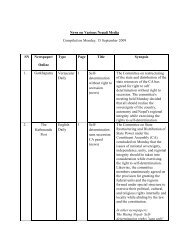
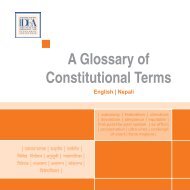
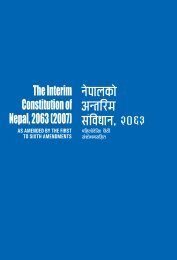
![g]k fnsf blntx? / gofF ;+l jwfg](https://img.yumpu.com/49483602/1/184x260/gk-fnsf-blntx-goff-l-jwfg.jpg?quality=85)
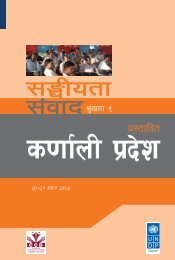
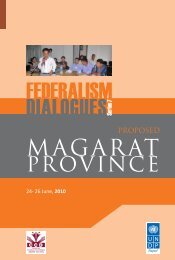
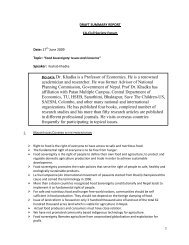
![+ljwfg;ef, /fHosf]k'g](https://img.yumpu.com/41604075/1/184x260/-ljwfgef-fhosfkg.jpg?quality=85)
